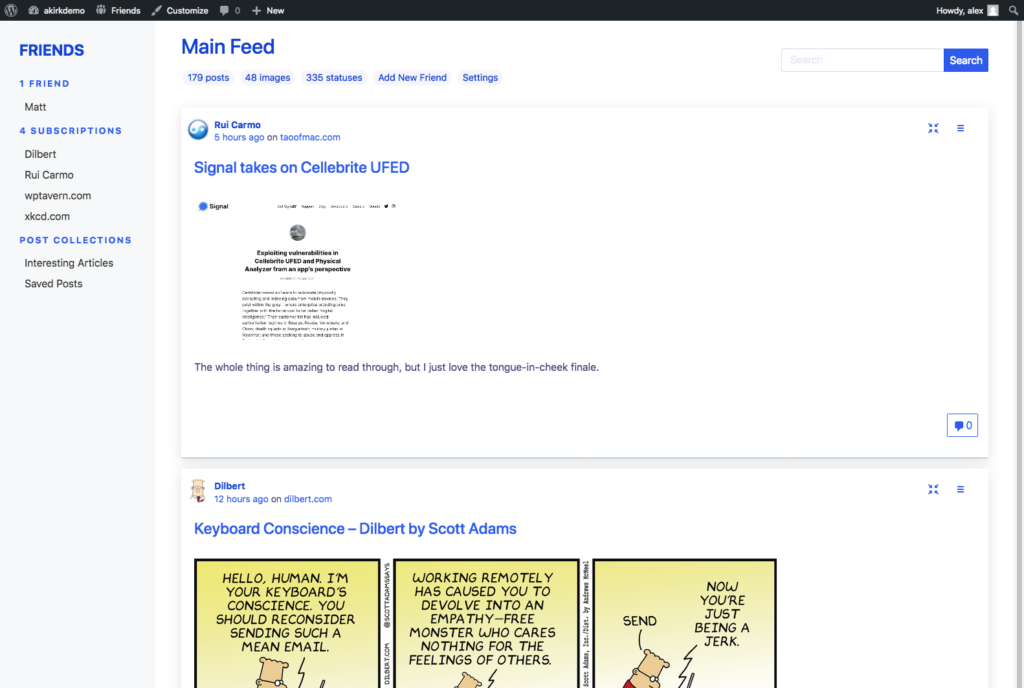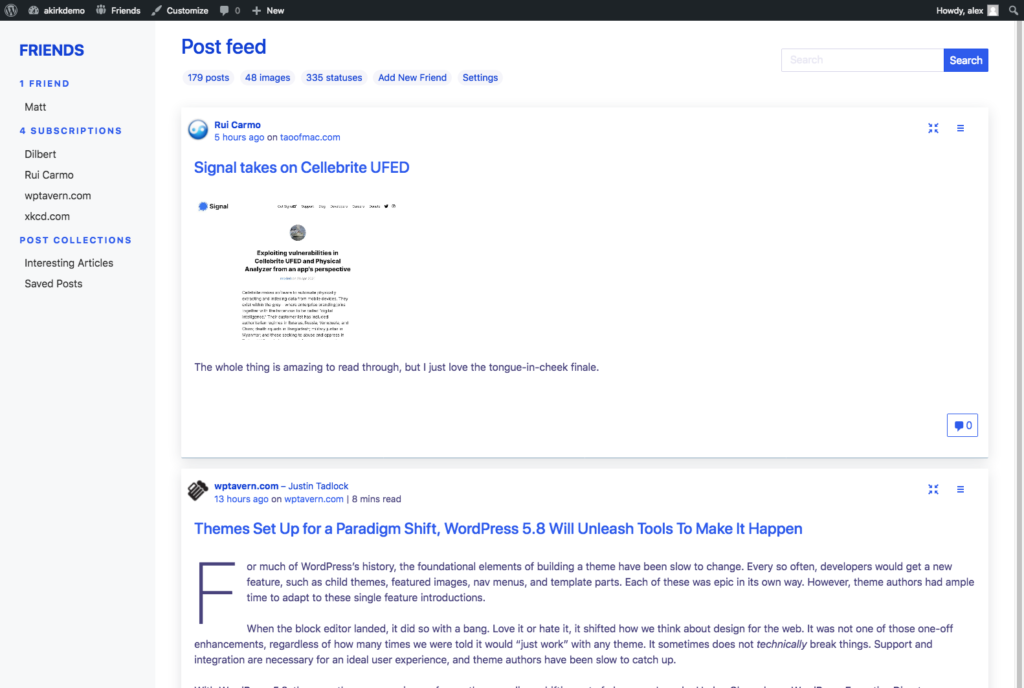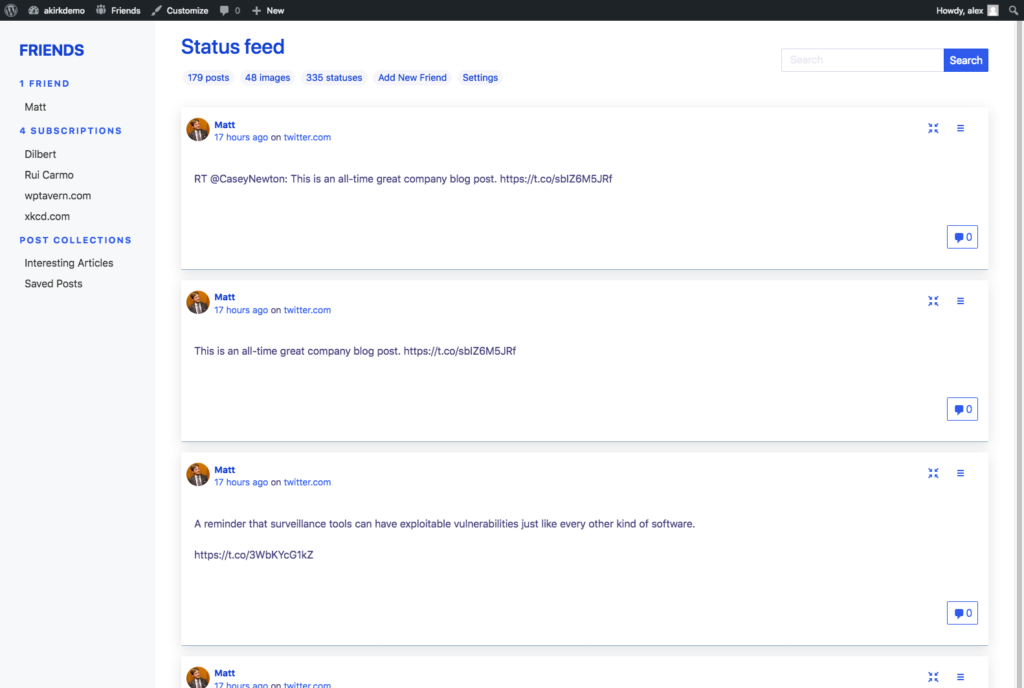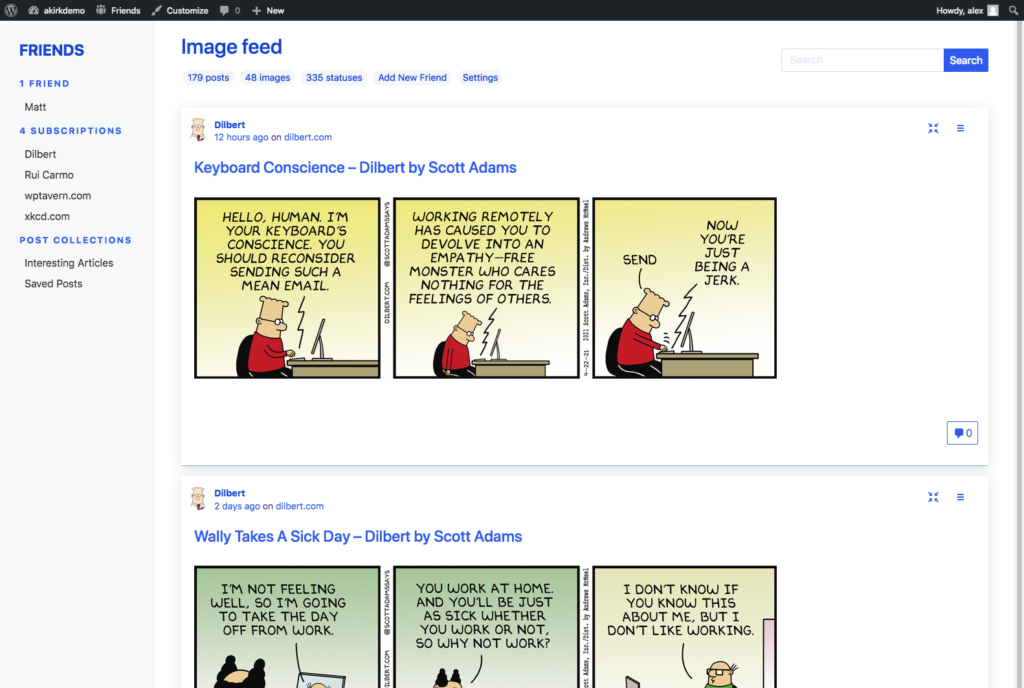I gave a talk at WordCamp Vienna 2023 about WordPress and the Fediverse. Find the presentation here:
Old News but still true as ever: Facebook and Instagram are harming the Open Web
A big motivation for building the Friends Plugin is to be able to follow what my friends and family are up to. Probably the most important “follow technology” is good old RSS.
While mostly used for public posts, there are many examples of how it can deliver posts not meant for the public: the solution are individual RSS feeds per subscriber, for example paid podcasts, or like the Friends plugin gives specific feeds to friends that can contain private posts.
Now reality is that (no longer) every platform has RSS feeds. It’d be easier if they just provided themt but alas. There are plugins for the Friends plugin itself that make use of projects that have built custom parsers for specific services: Fraidyscrape and RSS Bridge.
Now unfortunately, a lot of friends and family post to Facebook or Instagram. It’s just impossible to follow these friends outside of the platforms.
- They don’t provide (authenticated) RSS feeds. That would solve all of this.
- They rate limit and quickly block IPs (especially Instagram) that try to read a few posts unauthenticated.
- It’s unintuitive, developer centric and needs approval to get an API key, so it’s not something every user of the plugin can be asked.
- Their HTML is scrambled with random class names, preventing any classic scraping.
So in the end, the content of my friends and family is locked in. It would be a solution for them to create their own blog (IndieWeb style) and share their content that way. But I am realistic enough to understand that the hurdles are great. They are already connected to their friends inside Facebook or Instagram. They get lots of likes and responses there. They are used to the UI and the apps. It’s just not good for anyone who doesn’t want to join the Facebook ecosystem and be exposed to their ads.
We’re all using RSS Readers all the time…
… we just don’t realize it. If you think about it, most of the social network services are specialized RSS Readers that combine consuming with creating. (Just to be clear, these social networks don’t provide RSS feeds, what I’m saying is that what they do could be done with RSS feeds.)
Take Facebook, for example:
- If you follow someone, you’re subscribing to their RSS feed.
- If you like a page, you’re subscribing to their RSS feed.
- If you become friends someone, you’re subscribing to their RSS feed and vice versa.
- If you view your timeline, you’re looking at all posts by your subscriptions (usually modified/filtered by Facebook).
- If you post something, it’s added to your RSS feed and the people who are subscribed to you (via follow or friendship) get your post in their feed.
Twitter is similar, they just limit the post format to “status”. Instagram limits the post format to “image”. Tiktok to “video”.
The problem that I see with this is that this happens in a centralized manner. With RSS readers, we already have the decentralized version of this technology. The benefit of social networks is that they solve a few problems well:
- Easily reachable and searchable user base (= audience).
- Easy account creation (just sign up here).
- They combine consuming with creation.
I see a possible solution in WordPress. There are many options to get WordPress hosting with your own domain. With the Friends Plugin you can then combine consuming and creating. The Friends plugin allows you to consume the web your way, WordPress is a well established way of creating content.




By using post formats, you can also create different types of content and consume the same kind of incoming content combined. See the screenshots above, showing the main, combined feed, an image feed and a status feed.
Also, commenting on posts is built in to WordPress. With a friendship based approach you can even open up comments just to friends, which can reduce the usual “spam problem.”
What’s still missing for is the convenience of single-purpose apps. The cool thing is that these apps would talk to your own server which handles retrieving of followed content vs. this being relayed to a third party (who then knows the follow patterns of everyone on their platform). With Sunlit, micro.blog has implemented something like this for photo sharing inside their micro.blog platform but I believe this could be done for “RSS” as well.
The Indieweb movement follows very similar ideas to what I described above. The concept of webmentions allows you to respond to a post by posting to your own server, sending a ping to the original article. While the WordPress + Friends approach might be a bit more integrated, I see webmentions as a reasonable bridge between the worlds.
All in all, I believe having a personal blog is good for the health of internet. It’s unfortunate that in their history, personal blogs have this huge focus on “being public.” I believe it is equally well suited to be a place for more private communication, and especially a place where you can consume the web the way you like.